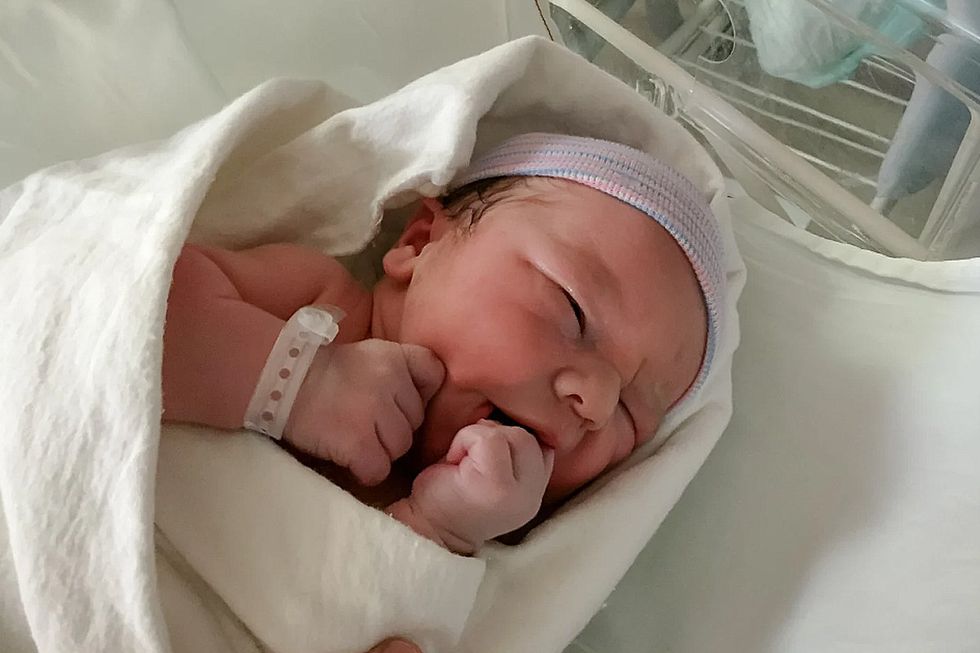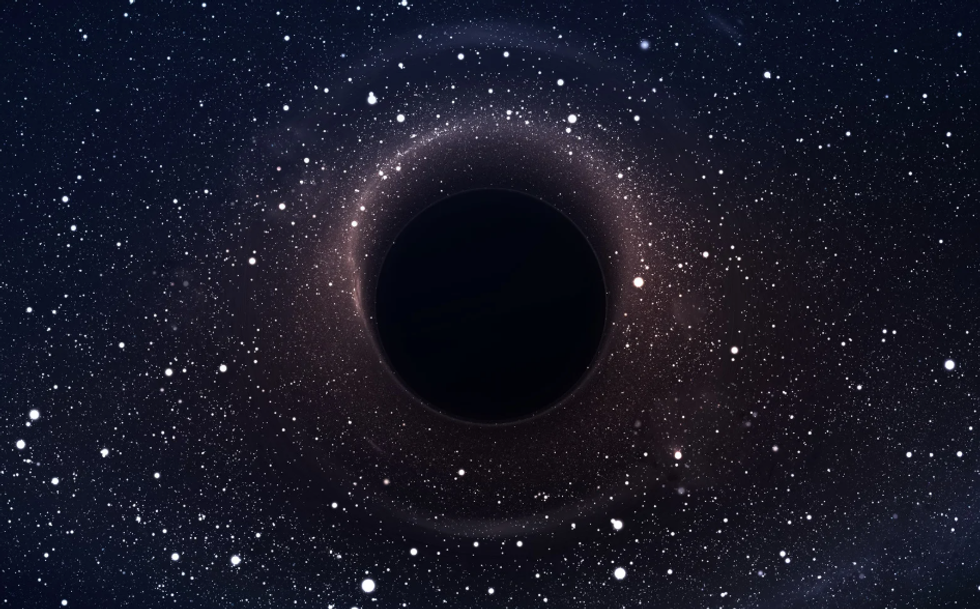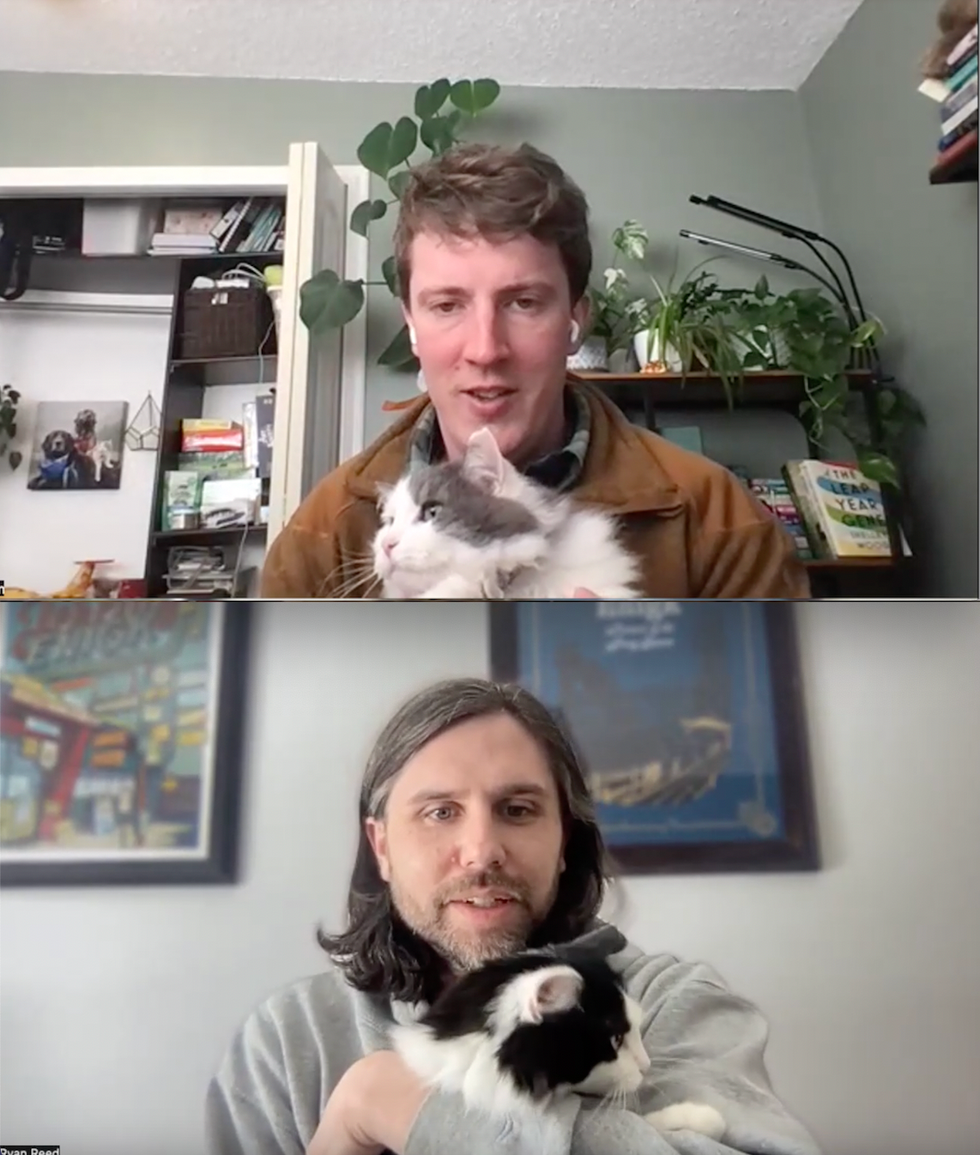THE GOOD NEWS:
Conspiracy theories are rarely real — and the commitment of these filmmakers helped expose an inconvenient truth about obsessive thinking.
When David Crowley returned from military service in Iraq in 2007, he was a changed man. He’d become a pacifist and wanted to be a filmmaker who could expose what he saw as the injustices of a world order that too often profited from war and the suffering of others. He had an easy smile and was well-liked in his small, Minnesota community. On the surface, he sounded like someone you’d meet at a Bernie Sanders rally.
By the time of his death, Crowley and his film project “Gray State” had become a star of the then-emerging alt-right movement. This was before the rise of Trump and the movement really took hold. Nonetheless, it had captured his imagination, with its focus on government conspiracy theories, and cravings for political revolution. Armed only with $6,000 of his own money, the military veteran with movie star looks, and an infectious charm, quickly rose to prominence with his self-funded movie trailer for “Gray State.”
“Gray State” was a dystopian thriller that embraced the darkest conspiracy theories of rightwing extremists: that corrupt global government forces and the “deep state” are actively conspiring against the American people. It wasn’t long after he’d posted the trailer for “Gray State” in 2012 that Crowley became a social media sensation and a beloved figure in the alt-right community. His ominous vision of the near-future attracted high-profile supporters like “Info Wars’” Alex Jones. A crowdfunding campaign for the film granted him the ability to pay himself a $70,000 salary to focus on the feature-length script — though Crowley had yet to film a second of the actual movie. “I strongly believe that Crowley was not really a storyteller,” acclaimed director Werner Herzog told GOOD. "If we had given Crowley $50 million dollars he still would not be beyond his trailer.”
Herzog executive produced a new documentary “A Gray State” about Crowley’s life and death with his long-time producing partner Erik Nelson. After seeing a small newspaper blurb about Crowley’s death in a local Minnesota paper, Nelson began an ambitious investigation into his mysterious life that formed the basis for his documentary.
“They were sincere in their beliefs," Nelson said. "They bought into it completely."
After raising nearly $70,000 through a crowdfunding campaign, Crowley finished the script and went to Hollywood where he successfully attached his script to a production company who shared his vision of raising $30 million to produce the movie. He was well on his way to becoming the next alt-right celebrity. Then, seemingly without explanation, he was dead, after killing his wife and their 5-year-old daughter, before apparently turning the gun on himself.
The gruesome deaths appeared to many to be the result of one man’s descent into madness. But to his followers, they were proof that Crowley had stumbled onto the truth, falling down the rabbit hole of an even more bizarre conspiracy theory: that Crowley was killed by the government in a pre-emptive move to stop his “message” from reaching the masses.
In 2016, Nelson partnered with New Yorker reporter Alec Wilkinson, traveling to Apple Valley, Minnesota, to investigate the mysterious circumstances surrounding the Crowley’s deaths. What they found was much stranger than either had imagined.
An accomplished documentary filmmaker, Nelson is best-known for his collaborations with Werner Herzog, who executive produced “A Gray State,” on films like "Grizzly Man" and “Cave of Forgotten Dreams.” He and Wilkinson gained incredible access to Crowley's surviving family, and hundreds of hours of footage filmed by Crowley himself stretching back nearly a decade to his days serving in Iraq.
Crowley had been meticulously documenting his life on camera right until the very morning of his murder-suicide on Christmas Day in 2014. When police arrived, they were greeted by the sound of a music playlist blaring from Crowley’s home speaker system that contained an assortment of orchestral tracks from films like “Spiderman 3” along with more contemporary songs. As officers entered the family home, they found a message scrawled in blood on the living room wall which read, “Allahu Akbar,” looming over a copy of the Koran opened to a section on forgiveness — a detail seemingly designed to fuel the wildest fears of the conspiracy theorists who’d obsessed about him.
A community calling itself “Justice for David Crowley” has since attracted thousands of followers despite its near complete lack of evidence or authoritative voices. As one such "citizen researcher" says in the film, "Credibility means nothing to me. What I care about is truth.” Nelson’s film quickly makes it clear that Crowley wasn’t the same political diehard so many of his fans are, and likely never embraced a unified political philosophy. Rather, his opinions were a collage of often-contradicting beliefs that fit nicely within the alt-right community, which is less about coherent principles and instead fueled more by conspiracy theories, resentment, and an extreme form of populist revolt against a perceived world order that is actively working against innocent, and often defenseless, citizens.
“It’s a core sample of American crazy,” Nelson said, “and he's right at the vortex of it.”
Despite being swept up in the crazy, Crowley wasn’t a racist, homophobe, or ignorant. The most unsettling moment in the film may be when Nelson intercuts footage of Crowley’s wife, Komel, with Crowley talking about how the Iraq war showed him how America had overstepped its bounds in what he called an “unjust” and “illegal” war.
Somewhere along the way, Crowley and his wife began to lose touch with reality. Their home videos in the months leading up to their deaths show Komel increasingly convinced that a dark, supernatural force has invaded their lives and she appears to be actively convincing Crowley that they should end their own lives to join others who have been “raptured.”
In the documentary, the couple's families say David and Komel slowly cut off contact with them, an experience echoed by Crowley's film producers who repeatedly tried to reach him in hopes of moving his project forward.
“I think Crowley was the victim of a vast conspiracy,” Nelson says. “It wasn't the conspiracy that he thought. The conspiracy is being an educated, somewhat aimless, white guy growing up in Minneapolis with a lot of time on his hands who got captivated by the gun culture, captivated by violent movies and video games, who thought he could become a star, a YouTube sensation.” Crowley never did see those dreams realized. Yet, Nelson has managed to piece together so much footage of Crowley and his family, that the film ends up nearly serving as Crowley's posthumous message to the world. It's the film he was never able to complete himself. But in Nelson's documentary, Crowley is the first person on screen, in archived interview footage, discussing his combat experience in Iraq, and how it helped shape his worldview.
“The idea of creating a lost film that was in essence created by a madman and being an accomplice to his work has of course given me thought,” Nelson said. “I grappled with it all the time but I didn't feel I had any choice. I always believed it was a window to a larger truth.” Ultimately, Crowley's failure to complete his film, and the tragic killings that ended the lives of his wife, child, and himself, raise more questions than answers.
As Nelson put his film together, a psychiatrist viewed the raw footage. “After a lot of time and effort, his basic conclusion was, ‘Beats me,’” Nelson said. “He couldn't figure this out.” Herzog remains deeply sceptical of those who blame Crowley's fall on mental illness. Instead, he sees a man beaten down by grandiose expectations that couldn't be fulfilled by what he called limited artistic abilities. Nelson is far more sympathetic toward Crowley's story but he's also not in denial about how his death has been hijacked by those who wish to use it to serve their own conspiratorial ends. “Everyone has a bully pulpit now,” he says. “The ‘Justice for David Crowley’ folks can disseminate as much content as they want on YouTube now. It’s much easier to create your own club now with rules and regulations.”
When Nelson was putting the finishing touches on his documentary, he had to decide how best to end a story that remains open-ended for so many. (Spoilers ahead.) His solution was to use footage taken just before the Crowley’s deaths, showing David playing with the family dog, Paleo.
In a heartbreaking moment in the film, David’s brother says that he wants the dog back. Nelson had to track down the dog’s whereabouts, but Paleo is now living with a new family. Crowley’s friend Mason Hendricks shot footage, which Nelson put together into a single minute of new film, showing Paleo running through a seemingly tranquil backyard, cautiously looking back at the camera. Herzog then picked the final shot of that sequence to end on before the film's credits while the same song Crowley had chosen for the soundtrack to his death plays.
That’s how “A Gray State” ends — but like all conspiracy-driven movements, it’s not the end of the story. Since the documentary’s release, the “Justice for David Crowley & Family” Facebook group say they have experienced a sharp rise in visitors to their page. The very existence of the film itself even has some members confidently speculating that Nelson is part of a larger conspiracy to cover-up the truth about Crowley’s death.
















 Representative Image: It take a special kind of heart to make room for a seventh child
Representative Image: It take a special kind of heart to make room for a seventh child  Representative Image: It take a special kind of heart to make room for a seventh child
Representative Image: It take a special kind of heart to make room for a seventh child 
 Visualization of a black holeImage via Canva
Visualization of a black holeImage via Canva

 Speaking in public is still one the most common fears among people.Photo credit: Canva
Speaking in public is still one the most common fears among people.Photo credit: Canva muhammad ali quote GIF by SoulPancake
muhammad ali quote GIF by SoulPancake

 Let us all bow before Gary, the Internet's most adventurous feline. Photo credit: James Eastham
Let us all bow before Gary, the Internet's most adventurous feline. Photo credit: James Eastham Gary the Cat enjoys some paddling. Photo credit: James Eastham
Gary the Cat enjoys some paddling. Photo credit: James Eastham James and Gary chat with Ryan Reed and Tony Photo credit: Ryan Reed
James and Gary chat with Ryan Reed and Tony Photo credit: Ryan Reed